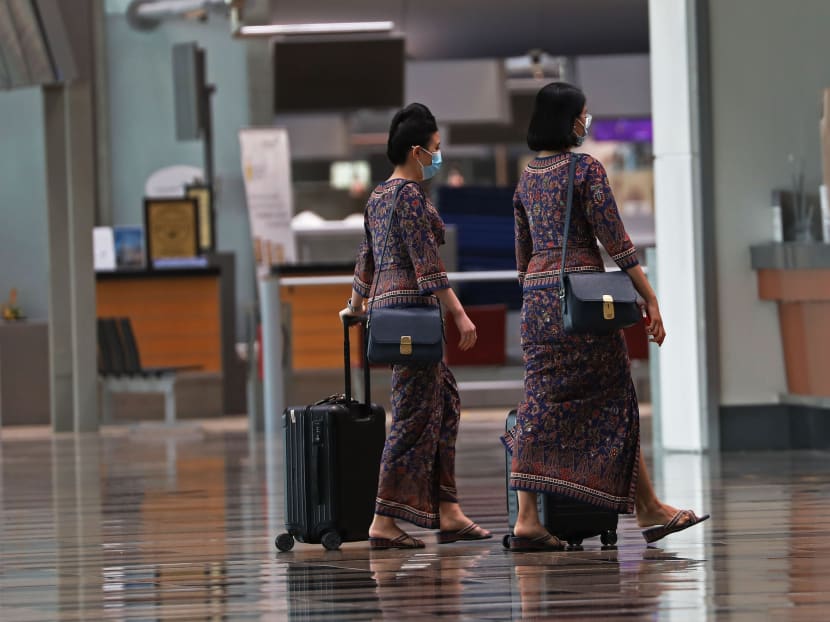No locally detected Omicron Covid-19 cases to date; over 200 travellers, aircrew being tested, 174 negative so far: MOH
SINGAPORE — There are no cases so far in Singapore where Covid-19 is caused by the Omicron strain of the coronavirus, but travellers and aircrew with recent travel histories to affected regions over the past 10 days are being tested as an added precaution.

Aircrew serving flights from regions hit by the Omicron variant would be subject to a polymerase chain reaction test on arrival in Singapore and to similar tests after that.
- MOH said on Nov 30 that there are no locally detected cases of the Omicron coronavirus strain so far
- However, travellers and aircrew with recent travel histories to affected regions are being tested
- Health Minister Ong Ye Kung listed five aspects of the new variant that need to be studied
- He added that “this is absolutely the wrong time” to hold back on vaccination and wait for a new vaccine
SINGAPORE — There are no cases so far in Singapore where Covid-19 is caused by the Omicron strain of the coronavirus, but travellers and aircrew with recent travel histories to affected regions over the past 10 days are being tested as an added precaution.
To date, more than 200 people have been tested and 174 have had negative results, the Ministry of Health (MOH) said on Tuesday (Nov 30).
Among the 174 were the seven passengers who had entered Singapore after being on a Singapore Airlines (SIA) transit flight from Johannesburg in South Africa. The flight carried two travellers who tested positive for the Omicron variant upon arrival in Sydney.
In a press release, MOH said that it is monitoring the situation closely and in particular, is looking out for more information on the Omicron variant, including its transmissibility, incubation period, infectious duration, severity of illness and efficacy of existing vaccines.
Speaking at a press conference by the multi-ministry Covid-19 task force, Health Minister Ong Ye Kung said that there are many aspects of the variant that need to be studied. He listed five key aspects.
“One, how infectious is it compared to previous variants? Two, what’s the incubation and the infectious period? Three, can antigen rapid test and other tests detect Omicron at the same level as other variants?
“Four, is it more or less harmful than Delta? Fifth, how well do existing vaccines work against it?”
In terms of vaccine efficacy, MOH said in its statement that based on early data, current vaccines should remain effective against severe disease and death.
“As a highly vaccinated population with a strong booster programme currently in progress, our community would have some protection against this new variant.”
It added, however, that more studies are needed to understand the actual impact of this variant on Singapore's existing countermeasures, including vaccines and treatments, because some of the mutations found in the variant’s genome were previously known to enhance transmissibility and reduce vaccine efficacy in other variants with these mutations.
Mr Ong noted that South African doctors have observed that among its cases with severe symptoms, 65 per cent are not vaccinated and the remaining 35 per cent are partially vaccinated.
While this is brief and early data, it suggests that the vaccine could still be effective and underscores the importance of vaccination, he said.
"If anything, it is a much more valuable insurance against a big unknown confronting the world now. So please continue to get your vaccinations and your booster shots.”
Mr Ong also said "this is absolutely the wrong time" to argue that because there are new variants, people should not vaccinate and instead wait for a new vaccine.
"People die because of such arguments and such decisions. Remember when we are faced with the unknown, we buy insurance," he added.
“The insurance is the existing vaccines. It is not a case where there are mutations and hence, existing vaccines will not work, because the human body is much more capable than that once vaccinated. There is a good chance existing vaccines will work against Omicron.”
MONITORING OVERSEAS DEVELOPMENTS
MOH said that there has been a rapid increase in the proportion of people who are infected by the Omicron variant in South Africa.
While the overall Covid-19 incidence rate in South Africa remains low, it is increasing.
Other countries have also reported cases over the past few days, suggesting that the variant has spread globally, with the variant detected in at least 13 other countries as of Monday.
The ministry added that it is monitoring the situation closely and is checking with health authorities worldwide to determine the variant’s characteristics.
At the press conference, Associate Professor Kenneth Mak, director of medical services at MOH, said: “We have much to learn about the Omicron variant, and it remains to be seen whether it is more transmissible. But irrespective, our current health protocols will be able to deal with the prospect of infections arising in our shores.”
He also gave an update on the SIA transit flight from Johannesburg.
The two travellers who tested positive for the Omicron variant when they landed in Sydney had transited through Singapore’s Changi Airport, but they did not leave the airport and were identified in the isolated transit area.
Of the seven passengers who entered Singapore, six are now on stay-home notice and one of them, who was a close contact of one of the positive cases, is serving a quarantine order.
MOH has not assessed a “significant risk of infection coming into Singapore” from passengers on the transit flight, Assoc Prof Mak said.
.embed-container { position: relative; padding-bottom: 56.25%; height: 0; overflow: hidden; max-width: 100%; } .embed-container iframe, .embed-container object, .embed-container embed { position: absolute; top: 0; left: 0; width: 100%; height: 100%; }







